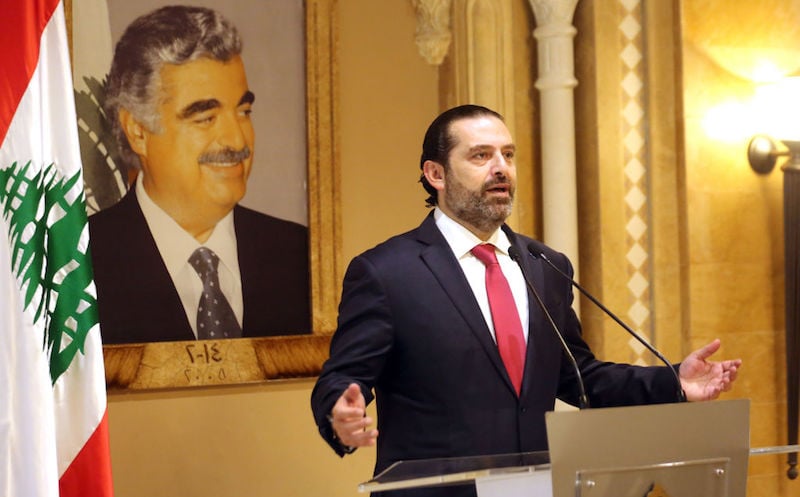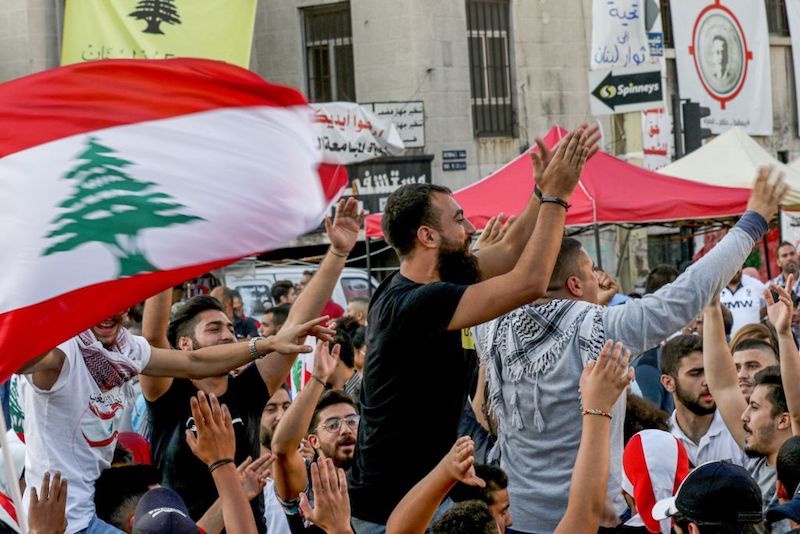Lebanon’s Hariri resigns after street protests turn violent
Hundreds of thousands of Lebanese have taken to the streets across the country since Oct. 17, demanding the ouster of the government

Lebanon’s Prime Minister Saad Hariri stepped down Tuesday after two weeks of anti-government protests descended into violence.
“Today, I won’t hide that I reached a dead end, and it’s time for a major shock to confront the crisis,” Hariri said in a televised address. “I’m going to the presidential palace in Baabda to submit my government’s resignation to the president and to the Lebanese people everywhere in response to their will.”
Hariri’s resignation came hours after supporters of the Iranian-backed Hezbollah party attacked demonstrators in central Beirut and destroyed their tents.
Live television footage showed hundreds of men throwing rocks at protesters who had blocked a major Beirut intersection and beating them with sticks and fists. The mob then descended on the main protest area in the capital, tearing down tents and setting them ablaze while warning that they wouldn’t allow their political leaders — Hezbollah’s Hassan Nasrallah and his ally, parliament speaker Nabih Berri — to be criticised or insulted.
The show of violence by Lebanon’s two main Shiite Muslim parties is a turning point in the uprising, which protesters say has transcended for the first time the sectarian and party divisions that tend to dominate Lebanese politics.
US secretary of state Michael Pompeo said in a statement on Tuesday that “the Lebanese people want an efficient and effective government, economic reform, and an end to endemic corruption. Any violence or provocative actions must stop, and we call upon Lebanon’s army and security services to continue to ensure the rights and safety of the protesters.”
The stakes are high for Lebanon, which straddles the region’s geopolitical fault lines and has often been a proxy battleground for the Middle East’s broader conflicts. The 15-year civil war ended in 1990 but still haunts a country where the warlords became the rulers and have remained in power ever since. It is this political class that protesters accuse of entrenched corruption that has brought the economy to the brink of crisis.
United Nations Secretary-General Antonio Guterres urged all sides to avoid violence.
“He calls on all political actors to seek a political solution that will preserve the stability of the country and respond to the aspirations of the Lebanese people,” according to an e-mailed statement from his press office. “He calls on all actors to avoid violence and respect the rights to peaceful assembly and expression.”
Celebrations broke out in central Beirut after Hariri’s announcement, with protesters thanking him for taking the first step to address popular demands. But protesters who began to regroup amid wrecked and smoldering tents said they now wanted other top officials to follow suit.

Hundreds of thousands of Lebanese have taken to the streets across the country since Oct. 17, demanding the ouster of a ruling class they say has lined its pockets from the public purse while neglecting services and living standards.
The government presented an emergency package last week that sought to address some of the grievances by laying out plans to rescue the country’s finances and set up an anti-graft committee. But it was rejected by demonstrators who said they would accept nothing less than the resignation of the government and key officials.
Since then, Hariri has sought to agree with his rivals on a new cabinet lineup to satisfy the crowds without leaving a political vacuum in one of the world’s most debt-laden economies. But he faced opposition from Hezbollah, an armed group that performed well in the last elections and is part of the largest coalition in parliament and government.
Nasrallah and his Christian allies in the political party of President Michel Aoun have opposed a change in the government, saying it could lead to chaos. He has accused the protesters of being funded by unspecified foreign agencies and embassies, and warned that the standoff might spark civil war if they did not end their road closures. Those accusations were widely repeated by the mobs who overran the protest camp, denouncing demonstrators as drug addicts with loose morals.
According to the constitution, Aoun must now hold parliamentary consultations and name a new prime minister who will be tasked with forming a new government. Demonstrators have called for a cabinet of technocrats to lead the country through the promised reforms and toward early elections based on a more equitable election law.
Hezbollah, considered a terrorist group by the U.S. and some European and other countries, has already seen its income dwindle as the U.S. has imposed sanctions on some of its members as well as its main backer, Iran.
Lebanon is struggling to find fresh sources of funding as the foreign inflows on which it has traditionally relied have dried up. Promises of assistance from Saudi Arabia and Qatar, Lebanon’s former benefactors, have largely failed to arrive. The government needs to cut spending, raise taxes and fight corruption to unlock some $11 billion in international aid pledges made at a Paris donor conference in 2018, but Hezbollah had opposed measures that would hurt low-income families that form large swaths of its support-base.
Lebanon sovereign dollar bonds extended losses after Hariri’s speech as the country entered an unpredictable new phase. Bonds due in 2021 bonds fell 4.2 cents to 72.385 cents on the dollar, taking the bid yield to a record high of 34.6%.
French Foreign MinisterJean-Yves Le Drian said his country was still determined to help the people of Lebanon but that would require a commitment to change from the political class.
“The conditions for stability is to listen to the voice and the demands of the population. Are Lebanon’s political leaders ready to run Lebanon together?” Le Drian said in the national assembly. “To put the country’s collective interest ahead of their interests? That is the question asked by the resignation of PM Hariri.”
